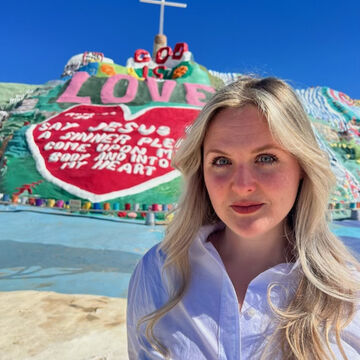|
Description
This course explores the rich genre of vernacular art environments' combinations of art, architecture and/or landscape architecture, including religious grottos, spiritual, devotional and mystical sites, gardens, ephemeral yard shows, architectural inventions, expressions of loneliness and survival, artist-built sites of conscience, homes fully transformed, artist's museums, and other created spaces that are site and life specific. The course examines historical and contemporary art environments and issues impacting art from beyond the academic mainstream and its evolving definitions, environments in their social, political and cultural contexts, home and landscape as studios, the viability and longevity of specific sites, and site preservation. Artists explored in this class include women, people of color, economically disadvantaged makers, farmers/rural dwellers, urban dwellers, and immigrants, among others. Artists' sites examined range from Sam Rodia's Watts Towers, Emery Blagdon's Healing Machine, Kea Tawana's Ark, to Ferdinand Cheval's Palais Ideal, and many more. Lectures are supported by video, audio, and a broad range of readings. Developing an awareness and appreciation for vernacular expressions in architecture, architectural cladding and ornament, garden ornament and yard shows, and other ordinary or beyond-ordinary visual arrangements in our shared, adorned environment is a subtext. Students complete readings and exploration and research projects. Sign up for this class requires instructor consent and is by application to Professor Nicholas Lowe. For more details please email nlowe1@saic.edu.
|
Class Number
2114
Credits
3
|
|
Description
This course explores the rich genre of vernacular art environments' combinations of art, architecture and/or landscape architecture, including religious grottos, spiritual, devotional and mystical sites, gardens, ephemeral yard shows, architectural inventions, expressions of loneliness and survival, artist-built sites of conscience, homes fully transformed, artist's museums, and other created spaces that are site and life specific. The course examines historical and contemporary art environments and issues impacting art from beyond the academic mainstream and its evolving definitions, environments in their social, political and cultural contexts, home and landscape as studios, the viability and longevity of specific sites, and site preservation. Artists explored in this class include women, people of color, economically disadvantaged makers, farmers/rural dwellers, urban dwellers, and immigrants, among others. Artists' sites examined range from Sam Rodia's Watts Towers, Emery Blagdon's Healing Machine, Kea Tawana's Ark, to Ferdinand Cheval's Palais Ideal, and many more. Lectures are supported by video, audio, and a broad range of readings. Developing an awareness and appreciation for vernacular expressions in architecture, architectural cladding and ornament, garden ornament and yard shows, and other ordinary or beyond-ordinary visual arrangements in our shared, adorned environment is a subtext. Students complete readings and exploration and research projects. Add: Sign up for this class requires instructor consent and is by application to Professor Nicholas Lowe. For more details please email nlowe1@saic.edu.
|
Class Number
2478
Credits
3
|

